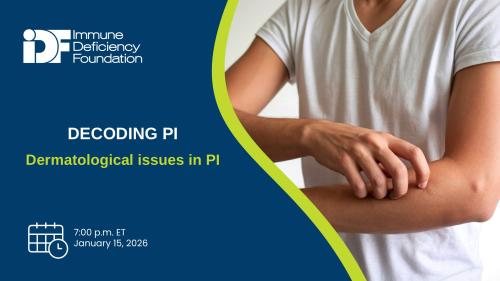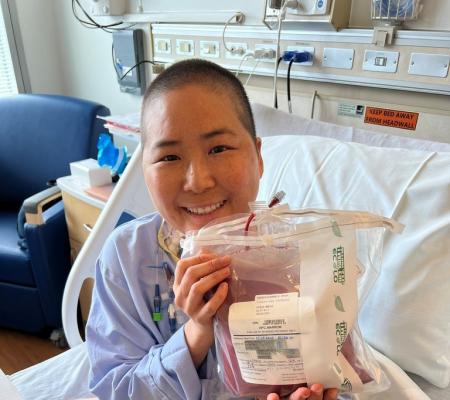
-
Understanding primary immunodeficiency (PI)

Understanding PI
The more you understand about primary immunodeficiency (PI), the better you can live with the disease or support others in your life with PI. Learn more about PI, including the various diagnoses and treatment options.
-
Living with PI
-
Addressing mental health
-
Explaining your diagnosis
- General care
- Get support
- For parents and guardians
-
Managing workplace issues
- Navigating insurance
-
Traveling safely

Living with PI
Living with primary immunodeficiency (PI) can be challenging, but you’re not alone—many people with PI lead full and active lives. With the right support and resources, you can, too.
-
Addressing mental health
-
Get involved

Get involved
Be a hero for those with PI. Change lives by promoting primary immunodeficiency (PI) awareness and taking action in your community through advocacy, donating, volunteering, or fundraising.
-
Advancing research and clinical care
-
Research Grant Program
-
Consulting immunologist
-
Diagnosing PI
-
Getting prior authorization
-
Clinician education
-
Survey research
-
Participating in clinical trials

Advancing research and clinical care
Whether you’re a clinician, researcher, or an individual with primary immunodeficiency (PI), IDF has resources to help you advance the field. Get details on surveys, grants, and clinical trials.
-
Research Grant Program
The gastrointestinal tract has more immune cells than any other organ in the body, so it stands to reason that those with a primary immunodeficiency are more at risk for gastrointestinal complications. In some cases, that’s true, but in others, perhaps not.
“When I have a zebra in my room and I’m hearing about their GI problems, I’m also thinking that they are horse, meaning that I want to make sure that every GI problem is not necessarily refracted through the prism of the primary immunodeficiency disease. Some are clearly connected, but it’s very important to get proper care on a whole for your GI issues,” explained Dr. Peter Mannon.
Chief of the Division of Gastroenterology and Hepatology at the University of Nebraska Medical Center Department of Internal Medicine and Director of the Paustian Inflammatory Bowel Disease Center, Dr. Mannon shared his presentation “Managing Gastrointestinal Complications of Primary Immunodeficiency” during an IDF forum on Sept. 10.
Dr. Mannon specializes in the care of people with Crohn’s Disease and ulcerative colitis, but also served as the in-house gastroenterologist for the immunology group at the National Institute of Health’s National Institute of Allergy and Infectious Diseases from 2000 to 2008, where he cared for people with CVID, CGD, and Job’s Syndrome, also known as Hyper Ig-E syndrome.
The presentation answered many questions concerning GI complications and PI. Why do GI complications happen? How often do they happen and who is at risk? What are the GI complications of PI? How can we manage them?
Dr. Mannon began by describing how the GI tract works and the problems that can be associated with the different parts of the system. Anything beyond the teeth is considered the GI tract, he said, and the following fall under his purview:
- Swallowing problems or heartburn related to the esophagus
- Digestive problems related to lack of acid secretions or stomach dysfunction which causes pain in the upper abdomen, feeling full after not much food, and vomiting
- Pancreatic enzyme deficiency
- Liver not making enough bile salts to help digest food
- Small intestine problems that can be obstructions or lack of ability to absorb nutrients which can lead to bloating, pain, or vomiting after large meals, large volume watery diarrhea, excess gas, and weight loss
- Colon problems which can result in diarrhea, blood in the stool, feeling of urgency, and incomplete evacuation
PI can cause gut complications including infections, inflammation/autoimmunity, and cancer risk. Dr. Mannon focused on symptoms that are most common in CVID and CGD.
CVID can heighten the risk of parasite and bacterial infections; cause the colonic bacteria to grow up into the small intestine, and lead to chronic norovirus infection. Autoimmune activity caused by CVID can lead to inflammation of salivary glands, the stomach, and the liver (resulting in chronic hepatitis). These conditions lead to weight loss, malnutrition, and chronic diarrhea.
There are ways to remedy some of the GI problems caused by CVID such as eliminate treatable causes like bacterial overgrowth, infection, and chronic norovirus with corticosteroids, hydroxyquine, and cyclosporine. If needed, another avenue to recovery is to provide a person nutrition through a vein.
In GI complications due to CGD, people experience abscess formation which leads to infection in the form of liver, perianal, and dental abscesses. CGD also causes inflammation in the form of non-resolving granulomas and results in swallowing problems, oral ulcers, gastric outlet obstruction, small bowel obstruction, and colitis.
Treatments for GI complications due to CGD include conventional inflammatory bowel disease therapies such as mesalamine and corticosteroids; and antibiotics and steroids for gastric obstruction from the granulomas. Other therapies include HLA-identical cord-blood stem cell transplant to correct the defect or surgery to drain larger, more troublesome abscesses.
While cancer is not high on his list of concerns in persons with PI and GI complications, said Dr. Mannon, it is worth noting because whenever there is chronic inflammation, there is an increased risk of cancer. Overall, cancer rates are generally less than 5 percent, however.
While Dr. Mannon’s discussion centered on how to approach GI complications and symptoms and how they fit into the specific disease categories, he also conveyed two other messages - that GI issues may not necessarily be connected to your PI and that the “good” bacteria is affected by taking too many antibiotics.
In relation to knowing if GI complications are connected to PI, Dr. Mannon suggested exploring all avenues of possibility when it comes to causes.
“I always want to make sure that I am not missing routine things that could be causing the symptoms. So, maintaining awareness of risk and possible PID-specific complications (is important),” said Dr. Mannon. “Not all GI symptoms are due to the PID, so a routine, thorough workup is always valuable.”
As far as the gut microbiome is concerned, Dr. Mannon said, “There’s a lot of misinformation, misunderstanding, misperception about what this is, what probiotics do, how important it is that you are making sure you are paying attention to this.”
Dr. Mannon said there are about 100 trillion bacteria in the gut but they are about 1,000 times smaller than cells, so they don’t overwhelm your body. A lot of the bacteria flows from your mouth into your stomach. The stomach, because of its acid production, neutralizes and kills a lot of these organisms, so the upper parts of the small intestine have very low counts of bacteria. Typically, that increases as you get to the colon.
“The colon is really the big fermentation factory where the bacteria digest a lot of the unabsorbed calories, particularly dietary fiber, and this is probably one of the best sources of nutrition for your bacteria,” said Dr. Mannon.
“It’s most important to try to foster your own healthy gut microbiota and the best way to do that is with a diet that’s high in fiber, 25 grams a day at least, from a variety of sources – seeds, nuts, whole grains, root vegetables. You want things that have more fiber per ounce than anything else and from a rich variety of food.”
Dr. Mannon said that your gut microbiome is changing all the time and is influenced by factors like diet, drug exposure (including repeated doses of antibiotics), disease state, and genetic background.
While approaches to maintaining order in the gut microbiome do include probiotics, prebiotics, synbiotics, as well as fecal transplant, and more highly targeted antibiotics for C. difficile, Dr. Mannon said he avoids recommending probiotics, which are not FDA regulated.
“I’m the co-director of the Nebraska Microbiome Initiative and I don’t prescribe probiotics because my feeling is we don’t know enough about them,” said Dr. Mannon. “I believe that probiotics are the future, but they are not here now yet.”
To watch the entire presentation of “Managing Gastrointestinal Complications of Primary Immunodeficiency Diseases,” click here.
Topics
Related resources
Sign up for updates from IDF
Receive news and helpful resources to your cell phone or inbox. You can change or cancel your subscription at any time.





The Immune Deficiency Foundation improves the diagnosis, treatment, and quality of life for every person affected by primary immunodeficiency.
We foster a community that is connected, engaged, and empowered through advocacy, education, and research.
Combined Charity Campaign | CFC# 66309




